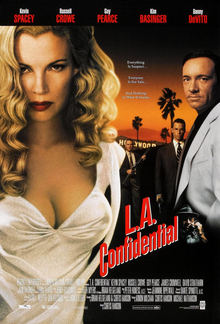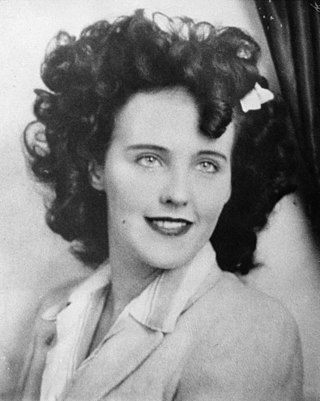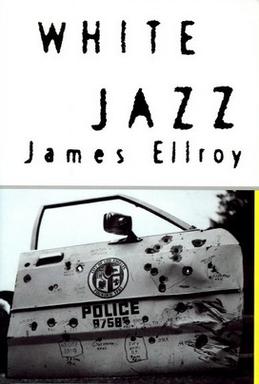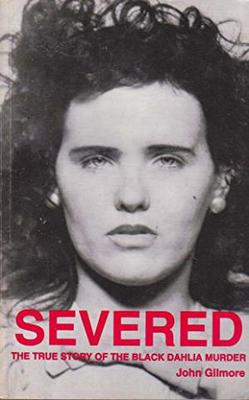
L.A. Confidential is a 1997 American neo-noir crime film directed, produced, and co-written by Curtis Hanson. The screenplay by Hanson and Brian Helgeland is based on James Ellroy's 1990 novel, the third book in his L.A. Quartet series. The film tells the story of a group of LAPD officers in 1953, and the intersection of police corruption and Hollywood celebrity. The title refers to the 1950s scandal magazine Confidential, portrayed in the film as Hush-Hush.

Lee Earle "James" Ellroy is an American crime fiction writer and essayist. Ellroy has become known for a telegrammatic prose style in his most recent work, wherein he frequently omits connecting words and uses only short, staccato sentences, and in particular for the novels The Black Dahlia (1987) and L.A. Confidential (1990).

The Black Dahlia (1987) is a crime fiction novel by American author James Ellroy. Its subject is the 1947 murder of Elizabeth Short in Los Angeles, California, which received wide attention because her corpse was horrifically mutilated and discarded in an empty residential lot. The investigation ultimately led to a broad police corruption scandal. While rooted in the facts of the Short murder and featuring many real-life people, places and events, Ellroy's novel blends facts and fiction, most notably in providing a solution to the crime when in reality it has never been solved. James Ellroy dedicated The Black Dahlia, "To Geneva Hilliker Ellroy 1915-1958 Mother: Twenty-nine Years Later, This Valediction in Blood." The epigraph for The Black Dahlia is "Now I fold you down, my drunkard, my navigator, My first lost keeper, to love and look at later. -Anne Sexton."

John Gregory Dunne was an American writer. He began his career as a journalist for Time magazine before expanding into writing criticism, essays, novels, and screenplays. He often collaborated with his wife, Joan Didion.

Elizabeth Short, known as the Black Dahlia, was an American woman found murdered in the Leimert Park neighborhood of Los Angeles, California, on January 15, 1947. Her case became highly publicized owing to the gruesome nature of the crime, which included the mutilation and bisection of her corpse.

My Dark Places: An L.A. Crime Memoir is a 1996 book, part investigative journalism and part memoir, by American crime-fiction writer James Ellroy. Ellroy's mother Geneva was murdered in 1958, when he was 10 years old, and the killer was never identified. The book is Ellroy's account of his attempt to solve the mystery by hiring a retired Los Angeles County homicide detective to investigate the crime. Ellroy also explores how being directly affected by a crime shaped his life - often for the worse - and led him to write crime novels. The book is dedicated to his mother.

The Black Dahlia is a 2006 American neo-noir crime thriller film directed by Brian De Palma and written by Josh Friedman, based on the 1987 novel of the same name by James Ellroy, in turn inspired by the widely sensationalized murder of Elizabeth Short. Starring Josh Hartnett, Scarlett Johansson, Aaron Eckhart, and Hilary Swank, the film follows two Los Angeles Police Department detectives investigating Short's murder, leading them through a series of shocking discoveries. Mia Kirshner, Mike Starr, Fiona Shaw, John Kavanagh, Rachel Miner, and Rose McGowan appear in supporting roles.

The Big Nowhere is a 1988 crime fiction novel by American author James Ellroy, the second of the L.A. Quartet, a series of novels set in 1940s and 1950s Los Angeles.
The Wonderland murders, also known as the Four on the Floor Murders or the Laurel Canyon Murders, are four unsolved murders that occurred in Los Angeles on July 1, 1981. It is assumed that five people were targeted to be killed in the known drug house of the Wonderland Gang, three of whom—Ron Launius, William "Billy" Deverell, and Joy Miller—were present. Launius, Deverell, and Miller, along with the girlfriend of an accomplice, Barbara Richardson, died from extensive blunt-force trauma injuries. Only Launius' wife Susan survived the attack, allegedly masterminded by organized crime figure and nightclub owner Eddie Nash. Nash, his henchman Gregory Diles, and porn actor John Holmes were at various times arrested, tried, and acquitted for their involvement in the murders.

White Jazz is a 1992 crime fiction novel by James Ellroy. It is the fourth in his L.A. Quartet, preceded by The Black Dahlia, The Big Nowhere, and L.A. Confidential. James Ellroy dedicated White Jazz "TO Helen Knode." The epigraph for White Jazz is "'In the end I possess my birthplace and I am possessed by its language.' -Ross MacDonald."
The L.A. Quartet is a sequence of four crime fiction novels by James Ellroy set in the late 1940s through the late 1950s in Los Angeles. They are:

True Confessions is a 1981 American neo-noir crime drama film directed by Ulu Grosbard and starring Robert De Niro and Robert Duvall as the brothers Spellacy, a priest and police detective. Produced by Chartoff-Winkler Productions, it is adapted from the novel of the same name by John Gregory Dunne, loosely based on the Black Dahlia murder case of 1947. Dunne wrote the screenplay with his wife, novelist Joan Didion. The film was released on September 25, 1981, receiving generally positive reviews from critics.

L.A. Confidential (1990) is a neo-noir novel by American writer James Ellroy, the third of his L.A. Quartet series. It is dedicated to Mary Doherty Ellroy. The epigraph is "A glory that costs everything and means nothing"—Steve Erickson.
Many Black Dahlia suspects, or persons of interest, have been proposed as the unidentified killer of Elizabeth Short, nicknamed the "Black Dahlia", who was murdered in 1947. Many conspiracy theories have been advanced, but none have been found to be completely persuasive by experts, and some are not taken seriously at all.

Thomas Joseph Spellacy was an American politician and lawyer. He was the 47th Mayor of Hartford, Connecticut, held several other offices, and was one of Connecticut's most prominent Democrats over a period of more than 50 years.
Brenda Allen was an American madam based in Los Angeles, California, whose arrest in 1948 triggered a scandal that led to the attempted reform of the Los Angeles Police Department (L.A.P.D.). Allen received police protection due to her relationship with Sergeant Elmer V. Jackson of the L.A.P.D.'s administrative vice squad, who reportedly was her lover.

The Gangster Squad, later known as the OrganizedCrime Intelligence Division (OCID), was a special unit of the Los Angeles Police Department (LAPD) formed in 1946 to keep the East Coast Mafia and organized crime elements out of Los Angeles, California.

Thaddeus Franklin Brown was the police chief of the Los Angeles Police Department from July 18, 1966 to February 17, 1967. Brown, who was the LAPD's Chief of Detectives, was appointed police chief on July 18, 1966, following Chief William H. Parker's death on July 16, 1966. Brown was succeeded by Thomas Reddin on February 17, 1967. His brother, Finis Brown, was also on the LAPD, and was one of the noteworthy police officers who investigated the Elizabeth Short murder, also known as the Black Dahlia murder.

Severed: The True Story of the Black Dahlia Murder is a 1994 American historical true crime book by John Gilmore. The book details the life and death of Elizabeth Short, also known as "The Black Dahlia," an infamous murder victim whose mutilated body was found in Leimert Park, Los Angeles in 1947, and whose murder has remained unsolved for decades.
The Black Dahlia: A Crime Graphic Novel is a graphic novel adaptation of James Ellroy's novel The Black Dahlia, by Alexis Nolent and David Fincher, and illustrated by Miles Hyman. Originally published in 2013 in French as Le Dahlia Noir, it was published in English in June 2016, by Archaia Entertainment, a division of Boom! Studios.














